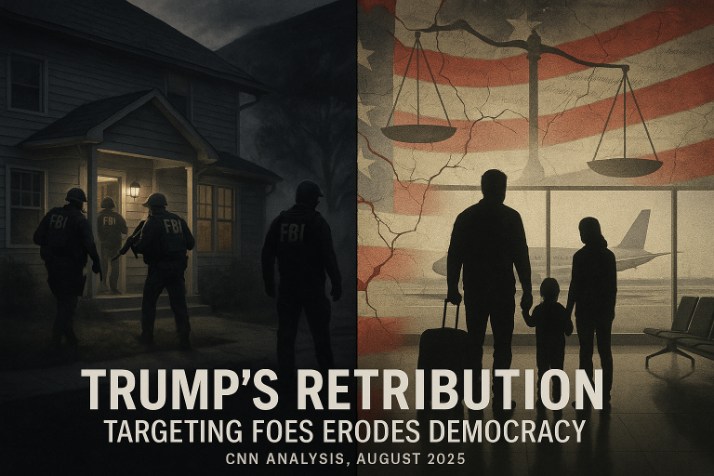Whispers of Vengeance: The Chill of Probes in a Divided Nation
In the quiet suburbs of Virginia, where autumn winds rustle through manicured lawns, a knock at dawn shatters the peace—FBI agents, badges flashing, descending on John Bolton’s home like shadows from a forgotten feud. This August 22, 2025, raid isn’t isolated; it’s the latest verse in President Donald Trump’s tortured history of targeting foes, a campaign of legal retribution that weaves through courtrooms and family hearings, leaving lives upended and trust in tatters. For Bolton, once a trusted national security adviser turned vocal critic, the search feels like a personal reckoning—a reminder that in Trump’s America, yesterday’s ally can become tomorrow’s quarry. Across the political landscape, from New Jersey’s Chris Christie to Salvadoran deportee Kilmar Abrego Garcia, these moves stir a profound unease: When justice bends to grudges, who safeguards the innocent? This isn’t mere score-settling; it’s a human drama of fear and fallout, where probes promise accountability but deliver division, echoing the quiet dread of families caught in the crossfire.
In this era of whataboutism, Trump’s targeting of foes tugs at democracy’s fraying threads, urging us to confront the emotional weight of vengeance dressed as law.
Scars of the Settled: Lives Upended by Retribution’s Reach
Imagine the tremor in a spouse’s voice as agents rifle through drawers, or the hollow ache of a father deported to an unfamiliar shore, his children’s pleas echoing unanswered. For John Bolton, the raid unearths not just files but fractured loyalties—his book The Room Where It Happened a catalyst for Trump’s ire, now manifesting in federal scrutiny that chills former colleagues into silence. Chris Christie, the blunt-spoken ex-governor, faces whispers of revived “Bridgegate” probes, Trump’s August 25 social media barbs tying old scandals to fresh threats, evoking a weariness born of endless scrutiny.
Kilmar Abrego Garcia’s ordeal cuts deepest: Deported to El Salvador on unproven MS-13 claims, returned via court order only to face smuggling charges from 2022, his not-guilty plea drowned in plans for Ugandan exile before trial. His family’s denial of gang ties underscores the human rift—loved ones piecing together normalcy amid legal limbo, a poignant emblem of how Trump’s targeting of foes ripples into homes, fostering isolation and injustice. These aren’t footnotes; they’re the quiet agonies of those ensnared, where political vendettas exact a toll measured in lost sleep and shattered securities.
The Ledger of Legal Gambits: Timeline and Facts of Trump’s Retribution
The facts form a ledger of launches and letdowns, chronicling a pattern of probes that promise thunder but deliver drizzle. Trump’s first term birthed the Durham investigation in 2019, a late-hour bid to unravel the Russia probe’s origins—yielding three charges, two acquittals, and one probation from prior work, a far cry from the bombshell anticipated. House Republicans’ Biden impeachment push faltered when a star witness was convicted for FBI lies on a $10 million bribe tale, derailing the inquiry.
Contrast that with Trump’s ledger: Around 10 allies convicted or pleading guilty, his own Manhattan conviction, sexual abuse liability, civil fraud findings, and shelved indictments post-reelection or technicalities—like the dismissed classified documents case, ruled on a special counsel glitch by a Trump judge, despite ex-AG William Barr decrying government “deception.” Recent salvos: Bolton’s August 22 searches, Christie’s scandal revivals, and Abrego Garcia’s deportation tango—initial MS-13 claims debunked, smuggling charges filed, yet Uganda-bound before trial, per White House spokesperson Abigail Jackson and AG Pam Bondi. No convictions yet from these new waves, but the optics endure: A DOJ tilted toward shaming over substantiation.
Echoes of Imbalance: Retribution in the Shadow of Democratic Norms
This saga of Trump’s targeting foes isn’t siloed; it’s a stark stanza in America’s partisan opera, where whataboutism reigns as Fox’s Greg Gutfeld quips on August 25, “Some people say it’s retribution; I say, who cares? Don’t lecture me on politically motivated investigations. You guys invented this stuff.” Yet experts discern disparity: Past Trump probes crumbled on evidence, unlike the robust cases against him, per legal observers who see these as “message-sending” theater—detailed affidavits for public spectacle, not courtroom closure.
Historically, it mirrors Nixon’s “enemies list” but amplified by social media megaphones, inverting Watergate’s lessons: Where once safeguards curbed abuse, now norms erode under executive zeal. Socially, it deepens chasms—Democrats decry weaponization, Republicans hail reckoning—while human costs mount: Families like Abrego Garcia’s, torn by hasty deportations, highlight inequities in enforcement. Broader strokes? A DOJ adrift from impartiality, with polls showing 60% fearing politicized justice per recent Pew data. Globally, it dims U.S. beacon status, a cautionary chord for democracies flirting with strongman strains. Internal link: Nixon’s Enemies List Revisited. External: BBC on Global Retribution Trends.
Horizons of Reckoning: Safeguards Against the Slide
As probes proliferate, calls swell for firewalls: Bipartisan ethics codes insulating DOJ from Oval whims, whistleblower shields, and congressional oversight to vet “shame campaigns.” For the targeted, resilience roots in advocacy—Bolton’s memoirs, Christie’s resilience—turning pain to public pleas. Nationally, midterms could recalibrate, voters demanding evidence over enmity.
Globally, a stark dispatch: Fortify institutions against charisma’s pull, lest retribution’s cycle spins unchecked.
Threads of Justice Frayed: The Human Echo of Trump’s Targeting
In the wake of Trump’s targeting of foes—from Bolton’s raided refuge to Abrego Garcia’s exiled anguish—a somber reflection endures: Retribution’s blade cuts deepest into democracy’s flesh. Gutfeld’s defiant shrug belies the quiet erosion, where failed probes like Durham’s mock the majesty of law. Yet in this imbalance, hope flickers: A nation’s resolve to reclaim impartiality, honoring the human cost with vigilant reform. For the foes turned families, may the gavel fall not on grudges, but grace—restoring justice’s steady hand.






